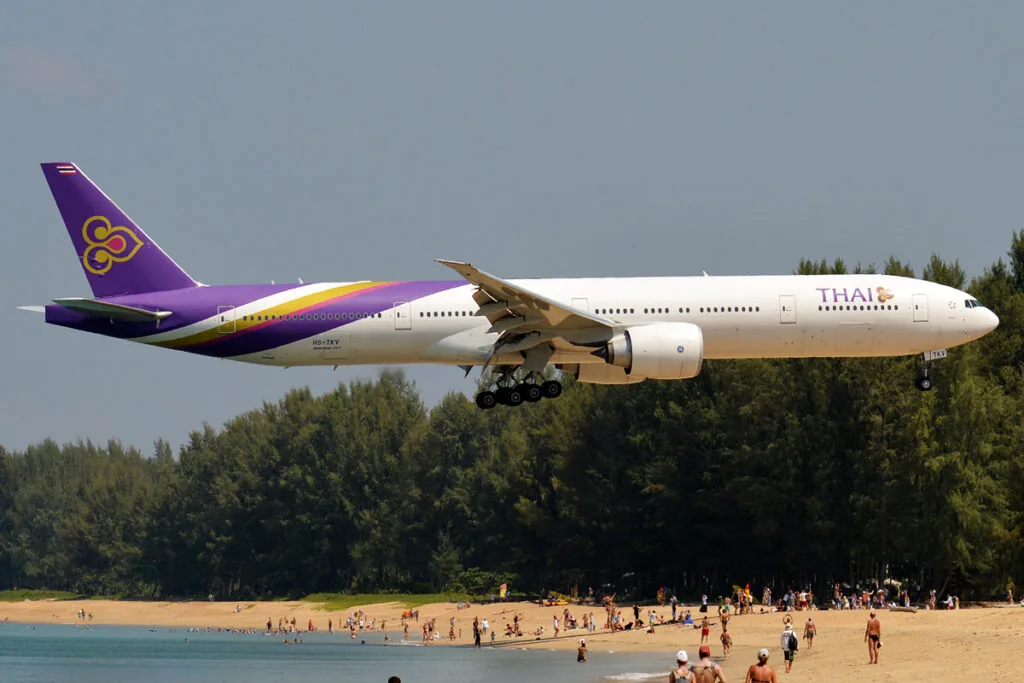
Thai Airways will add inflight internet to its A321neo and 777 aircraft from 2025. The carrier chose NEO Space Group (NSG) as its provider, making it the first publicly announced customer for the IFC upstart and its Skywaves solution.
Our partnership with NSG allows us to vastly improve our in-flight connectivity and offer our passengers new levels of convenience, entertainment, and comfort. This initiative marks a significant step in our journey to redefine passenger expectations. – Mr. Wirush Theparak, Head of Customer Experience and Product, THAI Airways
NSG’s promises internet speeds up to 200Mbps on board. Thai also announced that the service will be complimentary for members of the Royal Orchid Plus frequent flyer program as well as premium cabin passengers.
Read more: SES, ThinKom expand testing for multi-orbit inflight connectivity

The A321neo aircraft will be fitted as part of the Airbus HBCplus program, delivered from the airframer with the hardware installed. The existing 777 fleet will be retrofit to support the connectivity solution. In both cases the Safran Passenger Innovations (SPI) terminal, featuring the ThinKom Ka2517 antenna, will be installed on board.
The carrier contracted for 10 A321neo aircraft through lessor AerCap, expected to be delivered beginning in late 2024. It operates 22 777s today.
Turkish Airlines, too
Turkish Airlines is also joining the NSG party, with its new delivery A350-1000 fleet expected to carry the service as a line-fit option from 2026. The carrier added 15 of the type to its order book with Airbus at the end of 2023.

While not explicitly stated in this release, Turkish previously teased a transition to complimentary Wi-Fi on board for all passengers, beginning around the time that these planes will be delivered.
Coverage boost
NSG’s in-house satellite capacity stretches from the western coast of India across Northern Africa and most of Europe. That’s only a tiny fraction of the footprint where the fitted fleet will fly. But NSG still expects to service the entire Thai and Turkish route networks, thanks to capacity delivered through the SES Open Orbits network. Open Orbits brings multi-orbit satellite capacity (GEO and MEO today) with a global coverage footprint facilitated by multiple satellite operator partners. Aircraft can “roam” between satellite operators who participate in Open Orbits, with a single point of contact for network management and billing.
Because the Thai A321neo and Turkish A350s are HBCplus deals, SES will technically be the prime contractor with Airbus. The company made clear over the summer, however, that it expects other providers to handle the end-user relationship with airlines.
Read more: Eclipse snags 50+ plane connectivity retrofit deal
SES highlights its ability to deliver service across many countries where access can be more difficult to secure, thanks to existing relationships between satellite operators and regulators. For Thai Airways this should – eventually – mean removing the disclaimers around expected service outages when overflying certain countries including China, India, and Vietnam.
Read more: NEO Space Group ready to make its mark in IFC
“We are excited to support Thai Airways in elevating the passenger experience with reliable, high-speed internet,” added NSG CEO Martjin Blanken. “This collaboration marks not only the airline’s resurgence but also its forward-thinking vision, and we are proud to play a role in shaping its future.”
NSG previously indicated order from airlines in Europe, the Middle East, and Asia. This deal covers the Europe and Asia bits, but an additional airline announcement in the Middle East is expected.
Fully integrated solution
The Skywaves solution is a fully integrated offering from NSG, developed in collaboration with Display Interactive. It allows NSG to deliver a turnkey service, including a digital experience tailored to the airline’s needs or a managed capacity link, with the airline handling the portal and other passenger-facing elements itself.
Read more: SES Open Orbits brings multi-constellation, multi-orbit Ka-band connectivity together on a global scale
NSG’s VP Neale Faulkner is keen on this flexibility, noting “We’re not defining the passenger proposition, what services they can use, what they can’t use. That passenger proposition that can stay with the airline. We support them and advise them, but that stays with the airline.”
In addition to Display Interactive, NSG collaborates with Safran Passenger Innovations (and its use of ThinKom’s Ka2517 antenna), Eclipse, and others to provide multiple hardware options for fleet integration and deployment flexibility.
NSG is a PIF-owned company, backed by the Saudi government. It is a component of the nation’s Vision 2030 plan, aiming to boost NSG’s position as a key player in the global satellite services industry, while supporting the advancement of the region’s aviation sector through cutting-edge technology.
More news from APEX EXPO 2024
- NEO Space Group ready to make its mark in IFC
- FlytEDGE to fly on Qatar Airways A321neo fleet
- Telesat moves to join Airbus HBCplus portfolio
- NSG signs Thai Airways, Turkish Airways for inflight internet
- Delta boosts moving map accessibility with FlightPath3D update
- Copa adds wireless IFE with Inflight Dublin deal
- ThinAir Plus partner picked
- Virgin Atlantic teases eventual free Wi-Fi on board
- Seamless Air Alliance launches “Viper” QoE monitoring
- Money or Megabits? Making the case for connectivity business models
- JetZero seeks comfy cabins, fuel efficiency with blended wing design
- AI Hot Takes: Checking in from APEX EXPO
- Letting locals shine: Air Tahiti Nui extends inflight content to tourism opportunities
- Leading with LEO
A favor to ask while you're here...
Did you enjoy the content? Or learn something useful? Or generally just think this is the type of story you'd like to see more of? Consider supporting the site through a donation (any amount helps). It helps keep me independent and avoiding the credit card schlock.

Leave a Reply